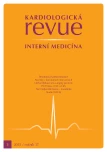-
Medical journals
- Career
Cardiac arrest and post‑cardiac arrest care
Authors: A. Krüger
Authors‘ workplace: Kardiocentrum, Nemocnice Na Homolce, Praha
Published in: Kardiol Rev Int Med 2015, 17(3): 230-233
Category: Cardiology Review
Overview
Out ‑ of ‑ hospital cardiac arrest occurs in 35 – 40 persons per 100,000 inhabitants per year. The rate of in‑hospital cardiac arrests is 1 – 5 for 1,000 hospitalisations per year. The probability of survival prior to hospital discharge is approximately 10% in out ‑ of ‑ hospital arrests; this doubles in cases of ventricular fibrillation as the initial rhythm. For in‑hospital cardiac arrests the probability of survival is slightly higher at 15 – 20%, again with better chances for a shockable initial rhythm (ventricular fibrillation/ tachycardia). Patient survival with a good neurological outcome is strongly dependent on immediate initiation of cardiopulmonary resuscitation and high quality post‑cardiac arrest care.
Keywords:
cardiac arrest – mild therapeutic hypothermia – extracorporeal resuscitation
Sources
1. Rubertsson SE, Lindgren E, Smekal D et al. Mechanical chest compressions and simultaneous defibrillation vs conventional cardiopulmonary resuscitation in out ‑ of ‑ hospital cardiac arrest: the LINC randomized trial. JAMA 2014; 311 : 53 – 61. doi: 10.1001/ jama.2013.282538.
2. Wang CH, Chou NK, Becker LB et al. Improved outcome of extracorporeal cardiopulmonary resuscitation for out ‑ of ‑ hospital cardiac arrest ‑ a comparison with that for extracorporeal rescue for in‑hospital cardiac arrest. Resuscitation 2014; 85 : 1219 – 1224. doi: 10.1016/ j.resuscitation.2014.06.022.
3. Lin JW, Wang MJ, Yu HY et al. Comparing the survival between extracorporeal rescue and conventional resuscitation in adult in‑hospital cardiac arrests: propensity analysis of three‑year data. Resuscitation 2010; 81 : 796 – 803. doi: 10.1016/ j.resuscitation.2010.03.002.
4. Chou TH, Fang CC, Yen ZS et al. An observational study of extracorporeal CPR for in‑hospital cardiac arrest secondary to myocardial infarction. Emerg Med J 2014; 31 : 441 – 447. doi: 10.1136/ emermed ‑ 2012 ‑ 202173.
5. Hypothermia after Cardiac Arrest Study Group. Mild therapeutic hypothermia to improve the neurologic outcome after cardiac arrest. N Engl J Med 2002; 346 : 549 – 556.
6. Bernard SA, Gray TW, Buist MD at al. Treatment of comatose survivors of out ‑ of ‑ hospital cardiac arrest with induced hypothermia. N Engl J Med 2002; 346 : 557 – 563.
7. Nielsen N, Wetterslev J, Cronberg T et al. Target temperature management at 33 °C versus 36 °C after cardiac arrest. N Engl J Med 2013; 369 : 2197 – 2206. doi: 10.1056/ NEJMoa1310519.
Labels
Paediatric cardiology Internal medicine Cardiac surgery Cardiology
Article was published inCardiology Review

2015 Issue 3-
All articles in this issue
- 25th European Meeting on Hypertension and Cardiovascular Protection, Milan 2015
- Leadless cardiac stimulation – future or fiction?
- A new device in intervention therapy of heart failure with preserved ejection fraction of left ventricle
- Latest developments in coronary interventions
- Multivessel coronary disease diagnosed at the time of primary PCI for STEMI: complete revascularisation versus conservative strategy. Prague-13 trial
- Pharmacological and non-pharmacological treatment of atrial fibrillation – a current view
- Therapeutic approaches in exertional angina pectoris
- Cardiac arrest and post‑cardiac arrest care
- Commented abbreviated 2014 version of ESC guidelines on the diagnosis and management of acute pulmonary embolism
- The implications of the new 2013 European guidelines for cardiac stimulation and heart-resynchronisation therapy in the area of arrhythmia diagnostics through long-term ECG monitoring. Current technical parameters and types of long-term ECG monitoring
- Fixed‑dose triple antihypertensive combination and subclinical organ damage
- IMPROVE‑ IT studies in patients with diabetes mellitus
- The TECOS study – the effect of sitagliptin on cardiovascular events in patients with type 2 diabetes mellitus
- Cardiology Review
- Journal archive
- Current issue
- Online only
- About the journal
Most read in this issue- Cardiac arrest and post‑cardiac arrest care
- Therapeutic approaches in exertional angina pectoris
- Leadless cardiac stimulation – future or fiction?
- A new device in intervention therapy of heart failure with preserved ejection fraction of left ventricle
Login#ADS_BOTTOM_SCRIPTS#Forgotten passwordEnter the email address that you registered with. We will send you instructions on how to set a new password.
- Career

